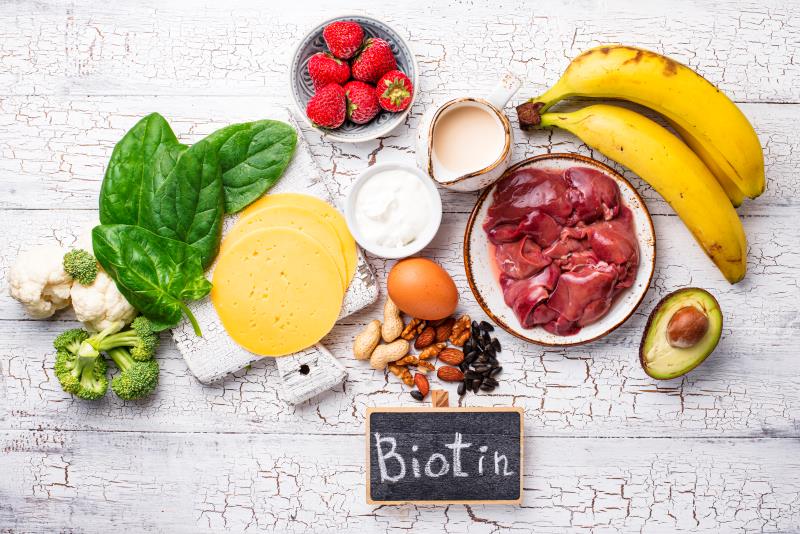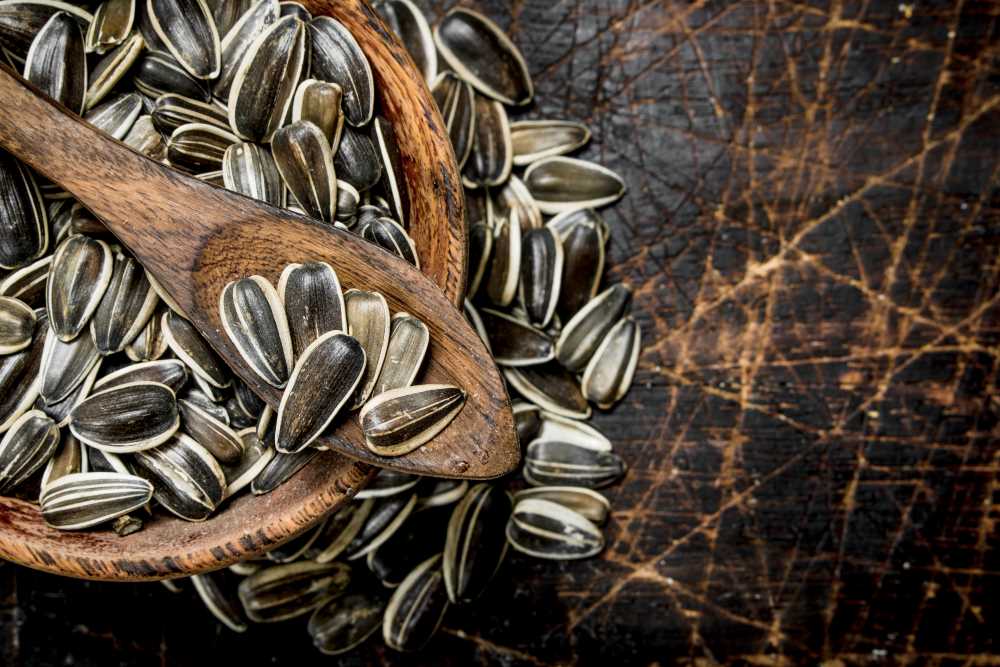18 Signs and Symptoms of Biotin Deficiency

Biotin Deficiency is a rare medical condition in humans. Reports say 1 out of 40000 infants have chances of developing this disease, resulting in symptoms like rash in eyebrows, cheeks, and certain neurological symptoms such as muscle pain, numbness, etc. In adults, this type of disease can occur due to excessive consumption of raw eggs (e.g. six eggs per day) over a long period of time.
In this piece, we have thoroughly discussed biotin and biotin deficiency diseases. Stay tuned!

Table of Contents

What Is Biotin?
Biotin (also known as Vitamin B7) is one of the B complex vitamins that are responsible for breaking down fat and carbohydrate and converting it into energy. The energy gained from Biotin provides the body with the necessary fuel to ensure smooth bodily functions.
Biotin is available in foods like eggs, milk and bananas. This B complex vitamin boosts good skin health and regulates blood sugar and LDL or bad cholesterol. The human body can make biotin with the help of the microbiome (a bacterial population that resides in the intestines).
Like all B vitamins, biotin is also water-soluble, meaning it does not store in the human body for a long time; hence, regular intake is necessary to avoid biotin deficiency diseases, i.e. diseases caused due to lack of biotin in the body.
What is Biotin Deficiency?
Biotin deficiency occurs when your body lacks sufficient B vitamins, such as biotin that is essential for metabolism and energy production. It can cause complications like hair loss, weak nails and skin problems. When there is a suspicion of biotin deficiency, the best thing would be to seek nutritional advice from any health provider.
How Common is Biotin Deficiency?
Common people rarely have this condition. Typically it affects individuals with specific congenital disorders who are on a course of long-term antibiotics or someone who eats too many raw eggs. Ingesting a well-balanced diet such as nuts, eggs and whole grains which have large amounts of biotin is enough to prevent most cases of deficiency.
What are the Signs & Symptoms of Biotin Deficiency?
Adults with biotin deficiency can show the following symptoms:
The symptoms in infants may vary from adults. Infants with biotin deficiency disease may be born without any signs and symptoms. However, symptoms can start to show a few weeks or months after birth. The majority of symptoms of biotin deficiency disease are neurological, meaning this medical condition affects the brain and nervous system.
Following are symptoms of biotin deficiency disease in infants:
Reasons that Cause Biotin Deficiency
As stated in the introductory paragraph, biotin deficiency is rare in humans. However, when infants or adults develop biotin deficiency disease, doctors usually attribute one of the reasons mentioned below,
1. Intestinal Troubles
Certain intestinal diseases such as Crohn’s Disease and Colitis can prevent the body from absorbing nutrients like biotin from foods. Hence, such medical conditions can cause biotin deficiency disease.
2. Biotinidase Disease
Biotinidase Disease is an inherited condition that prevents one’s body from utilising biotin. The human body can usually reuse biotin a few times before it moves out from one’s body. However, individuals with biotinidase disease cannot recycle this vitamin hence developing a related deficiency. This disease can be diagnosed early due to severe symptoms. On the other hand, the symptoms may appear in infants a few months after birth.
3. Medications
4. Long-term Dieting
Strict eating habits may exclude a vast number of minerals and vitamins from the diet. Further, if one continues to maintain this diet for a long-time, it can result in deficiency such as biotin deficiency and related diseases. Hence, one must take a balanced diet to avoid such deficiencies.
5. IV Feeding
Individuals who are receiving nutrition from an IV (intravenous) tube can develop biotin deficiency disease. Here, they must start taking supplements to avoid this deficiency disease.
6. Genetic Diseases
Certain genetic diseases such as Holocarboxylase Synthetase Deficiency, Biotin Transport Deficiency, and Phenylketonuria can cause Biotin Deficiency Disease. While Holocarboxylase Synthetase Deficiency, Biotin Transport Deficiency are rare diseases, Phenylketonuria is common in infants. However, males and females of all ethnic backgrounds can develop this medical condition.
What are the Diagnosis of Biotin Deficiency?
Several main methods are used by doctors to determine the influence of biotin deficit on the body:
Clinical Examination
Full physical examination is done to detect such symptoms as hair loss, skin rashes and neurological abnormalities which are common signs of biotin deficiency.
Dietary Assessment
It is vital to evaluate the patient’s diet to identify any insufficiencies in consumption of foods rich in biotin such as organ meats, egg yolks, nuts and seeds, which are important food sources for biotin.
Blood Test
Measuring the level of biotin in blood helps determine how bad the situation is. This involves assessing levels of biotin and its metabolites to confirm deficiency and guide treatment.
Medical History Review
To reveal pre-existing conditions or drugs that may impede the absorption or metabolism of biotin like certain anticonvulsants or prolonged use of antibiotics reviewing patients' medical history is essential.
Symptom Assessment
Assessing changes in skin, hair, and neurological function-related symptoms provides important clinical information on deficiencies in biotin storage.
These diagnostic approaches enable healthcare providers to accurately diagnose a person with a shortage of biotin hence individualising their treatment plans accordingly.
Best Food Sources to Overcome Biotin Deficiency
Discover a range of foods packed with biotin, listed below, that are essential for combating and preventing biotin deficiency.
Fruits to Overcome Biotin Deficiency

Take a look at these famously Biotin-rich fruits that can aid the prevention of deficiency or combat it healthily.
Vegetables to Overcome Biotin Deficiency

Check out these various vegetables that are rich in Biotin content that can help with your overall health:
Other Eatables to Overcome Biotin Deficiency

Several food options beyond fruits and vegetables are extremely healthy and contain a large amount of Biotin that you must look out for, such as:
How Much Biotin Do You Need Daily?
Understanding your daily biotin needs is crucial for maintaining overall health. The recommended intake for adults generally ranges from 25 to 305 micrograms (mcg) per day, with variations based on individual factors such as age and specific health conditions.
The recommended intake in this chart also varies based on individual health conditions and dietary plans.
Side Effects of Biotin Deficiency
Unchecked early symptoms of biotin deficiency can include the following persistent health issues:
- Hair loss
- Brittle nails
- Skin rashes
- Neurological symptoms like tingling or numbness
- Fatigue
It's important to address biotin deficiency promptly through dietary changes, supplements, and medical advice to prevent further health decline.
Diseases Caused Due to Biotin Deficiency
Following is a list of diseases caused by biotin deficiency -
- Alopecia (hair loss)
- Biotin deficient face (scaly, red rash around the orifices, i.e., eyes, nose, and mouth)
- Hypotonia (Muscle weakness)
- Ataxia (Problem in controlling body movements)
- Hepatomegaly (enlarged liver)
- Splenomegaly (Enlarged spleen)
Treatments for Biotin Deficiency
The treatment of biotin deficiency disease usually falls into two categories. These are:
1. Eating Biotin-rich Foods
For adults (19+), the recommended Adequate Intake (AI) for biotin is 30 mcg for males, 30 mcg for females, 30 mcg for pregnant women, 35 mcg for lactating mothers. Below is a list of biotin-rich foods that adults must eat -
- Carrots, cauliflower, and mushrooms
- Cooked eggs, especially egg yolk
- Sunflower seeds and sunflower butter
- Organ meats (including liver and kidney)
- Seafood (salmon, tuna)
- Whole grains include barley and corn
- Green peas, legumes, and lentils
- Dairy products (including milk, cheese, and yoghurt)
- Sweet potato
- Almond
Sometimes food processing destroys biotin. Hence, individuals must eat whole foods to get the maximum quantity of biotin.
2. Taking Supplements
Apart from eating biotin-rich foods, individuals can take supplements such as multivitamins or individual supplements to treat biotin deficiency disease. These types of supplements usually come in three amounts such as 10 mcg, 50 mcg and 150 mcg.
Individuals must consult with doctors before taking biotin supplements as these can interact with other medications, resulting in side effects. Further, there may be chances of taking too much biotin without proper knowledge or guidance from a doctor. Hence, individuals must know about the recommended intake of biotin to avoid biotin deficiency disease.
How to Prevent Biotin Deficiency?
Consume the above-mentioned biotin-rich foods, take supplements if necessary and consult with doctors regarding taking certain medications such as anti-seizure or antibiotics.
With a detailed discussion on biotin deficiency disease, we have reached the end of this piece. Read the details carefully and consult with doctors if you start experiencing any of the aforementioned biotin deficiency symptoms. In case of infants, parents must be careful about the signs and opt for treatment as early as possible.
How Long Does it Take to Fix Biotin Deficiency?
It takes time to address biotin deficiency; this will vary depending on how severe it is and the response of an individual towards treatment. Normally within a few weeks after adjustments in diet or administration of vitamin supplements, improvements will be visible in symptoms such as growth rate for both hair and nails. Returning to optimal biotin levels as well as restoring overall health may require consistent effort for several months. It is important to seek continuous professional support from healthcare providers who understand their patients individually so that they guide them appropriately in managing this condition effectively while maintaining a good life ahead.
Who is at Risk of Suffering from Biotin Deficiency?
Following is a list of conditions that may result in biotin deficiency disease:
1. People Who Have Biotinidase Disease
Biotinidase Disease is a rare hereditary disorder, where one’s body cannot recycle biotin. People who have this medical condition have increased chances of getting biotin deficiency. If biotinidase disease is left untreated, it can cause life-threatening complications.
2. People Who Take IV Feeding
IV nutrition or tube feeding can reduce the absorbing capacity of biotin. Individuals who rely on this type of nutrition may need biotin supplements till the time they are to consume solid foods.
3. People Who Take Certain Medications
Certain medications like antibiotics may affect healthy bacteria in the intestines, which are useful to make biotin in a body. Without these bacteria’s biotin production and low intake of the same (from foods) can make individuals biotin deficient.
Further, anti-seizure medications can lower biotin absorption capability. Hence, individuals who are taking these medications for a long time must take supplements to avoid biotin disease.
Apart from this, Pregnant women have chances of developing biotin deficiency disease.
One-third of pregnant women have chances of developing marginal biotin deficiency in spite of taking biotin-rich foods. If women have biotin deficiency during pregnancy, babies can develop certain birth defects.
In conclusion, identifying the signs and symptoms of biotin deficiency is key to preserving health. Early identification and treatment of biotin deficiency can help prevent these issues and ensure overall well-being. Ensuring a balanced diet rich in biotin or taking supplements as needed can effectively manage and prevent this deficiency.













